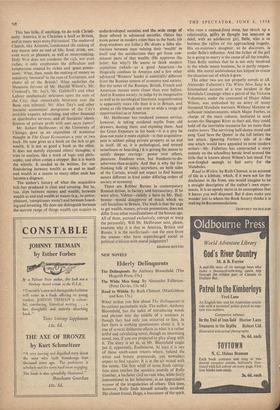NEW NOVELS
Elderly Delinquents
WHAT strikes you first about The Delinquents is its curious parenthetic style. The author, Anthony Bloomfield, has the habit of introducing words and phrases into the middle of a sentence as though they had only just occurred to him. In fact there is nothing spontaneous about it. It is one of several deliberate effects in what is a rather artful and calculating novel, though an interesting novel, too, if you are prepared to play along with it. The story is set in, as Mr. Bloomfield might put it, apparently, Eastbourne. At least it is one of those south-coast resorts where, behind the white and breezy promenade, you nowadays expect to find squalor. It is in the air mixed with the ozone. The first whiff of some fresh corrup- tion soon reaches the sensitive nostrils of Roily Gunther, a bachelor civil servant who, while fairly conventional in his behaviour, is an appreciative voyeur of the irregularities of others. This time, however, Rolly finds himself actually involved. His closest friend, Hugo, a buccaneer of the spirit, who runs a cannedafood stop', has struck up a relationship, gitilty in thought but innocent in deed, with an adoleScent girl, Belle, who is to become the victim of the approaching tragedy. His ex-mistress's daughter, so he discovers, is under Belle's influence. And the father of the girl he is going to marry is the cause of all the trouble. Then Rolly realises that he is not only involved in the whole messy business, he is partly respon- sible. His moral ambivalence has helped to create the situation out of which it grew.
The other two are not properly novels at all. Alexander Fullerton's The White Men Sang is a fictionalised account of a true incident in the Matabele Campaign when a patrol of the Victoria Volunteers, under the command of Major Allan Wilson, was ambushed by an army of many thousand Matabele warriors. Without Maxims or sufficient reinforcements, which Major Forbes, in charge of the main column, hesitated to send across the Shangani River to their aid, they could hold off the inevitable massacre for no more than twelve hours. The surviving half-dozen stood and sang 'God Save the Queen' in the lull before the last attack. Ignoring Forbes's side of it—the one which would have appealed to most modern writers—Mr. Fullerton has constructed a story entirely on the schoolboy heroic level around the little that is known about Wilson's last stand. I'm new-fangled enough to feel sorry for the Matabeles.
Road to Within, by Ruth Chomut, is an account of life in a kibbutz, which, if it were not for the disclaimer in the front, one would imagine to be a straight description of the author's own exper- iences. It is so openly naive in its assumptions that it leaves you well disposed. But it does make you wonder just to whom the Book Society thinks it is making its Recommendations.
GEOFFREY NICHOLSON










































 Previous page
Previous page